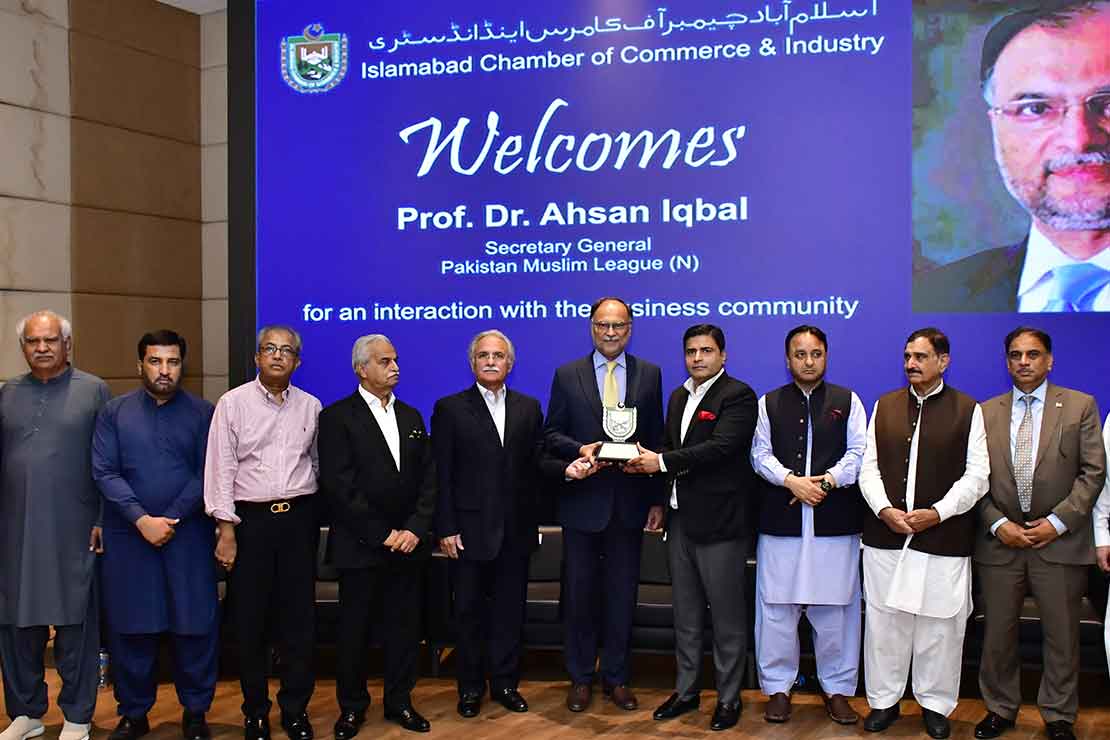Prof. Ahsan Iqbal, Secretary General,PML(N) and former Federal Minister for Planning & Development stressed on imposing an export emergency to boost exports and revive the economy. He said that the business community will have to play an active role in promoting exports by visiting foreign countries along with samples of products. He said that in the next 7-8 years, Pakistan will have to take its exports to US$ 100 billion to improve the economy. He said that the government should fully support the business community and remove all the hurdles in business promotion. He said this while addressing the business community at Islamabad Chamber of Commerce and Industry (ICCI). Former Chief Minister Gilgit-Baltistan Hafiz Hafeezur Rahman and former MNA Mian Abdul Manan also accompanied him on the occasion.
Ahsan Iqbal said that the biggest challenge for Pakistan is to repay the debt of USD 77 billion in the next 3 years and a rapid increase in exports is inevitable to discharge this obligation. He said that the countries are focusing on brands for exports and Pakistan also needs to promote its brands for exports promotion. He said that the interest rate should be reduced for the industry. He said that if the PML-N government comes in power, it will remove all obstacles in the way of business and promote ease of doing business in the country.
Ahsan Zafar Bakhtawari, President, Islamabad Chamber of Commerce and Industry said that all political parties should agree on a charter of economy to ensure long-term economic policies and steer the country out of the current crisis. He said that industrialization is key to strengthening the economy. He said that 22 percent policy interest rate is a major hurdle for business and investment promotion. High energy tariffs led to the high cost of doing business and the government should address these issues to help business growth. He said that despite being an agricultural country, Pakistan’s agricultural imports are US$ 8-10, which should be a cause of concern for the government. He said that the Chinese companies should be encouraged to invest in Pakistan with technology transfer. He invited all the political parties to present present their economic manifesto in ICCI, which will improve the confidence of the business community.
Hafiz Hafeezur Rehman, Former Chief Minister of Gilgit-Baltistan said that 70% of the work on Diamir Bhasha Dam has been completed, while the work on Dasu Dam is also in progress and the completion of these two dams will generate 10,000 MW of cheap electricity. He said that political stability is necessary for economic stability, so everyone has to play a role in this regard. He said that development projects worth 52 billion rupees have been finalized in GB and their completion will lead to better development of the region.
Former MNA of MPL(N) Mian Abdul Manan stressed that all stakeholders have to play a role for economic stability in Pakistan and end the ongoing crisis.
Khalid Iqbal Malik Group Leader ICCI said that the government should make economic policies in consultation with the business community, which will create a conducive environment for business and industrial activities. All loss-making SOEs should be privatized as they are a big burden on the national exchequer.
Zafar Bakhtawari, Former President ICCI and Secretary General UBG Pakistan said that the enemy is creating an atmosphere of inflation and instability in Pakistan through hybrid war, so we all have to work together to thwart this conspiracy. It is the urgent need of the hour that all the political parties put aside their differences and play their role for the economic stability of Pakistan. The government should focus on hydropower to provide cheap energy to industry.
Anjuman-e-Tajaran Pakistan President Ajmal Baloch, Jamshaid Akhtar Sheikh, Akhtar Hussain, Maqsood Tabish and others also expressed their views and emphasized that all political parties and institutions should work together to get Pakistan out of the current economic crisis.

Ahsan Iqbal calls for Export Emergency to boost exports
- September 21, 2023

